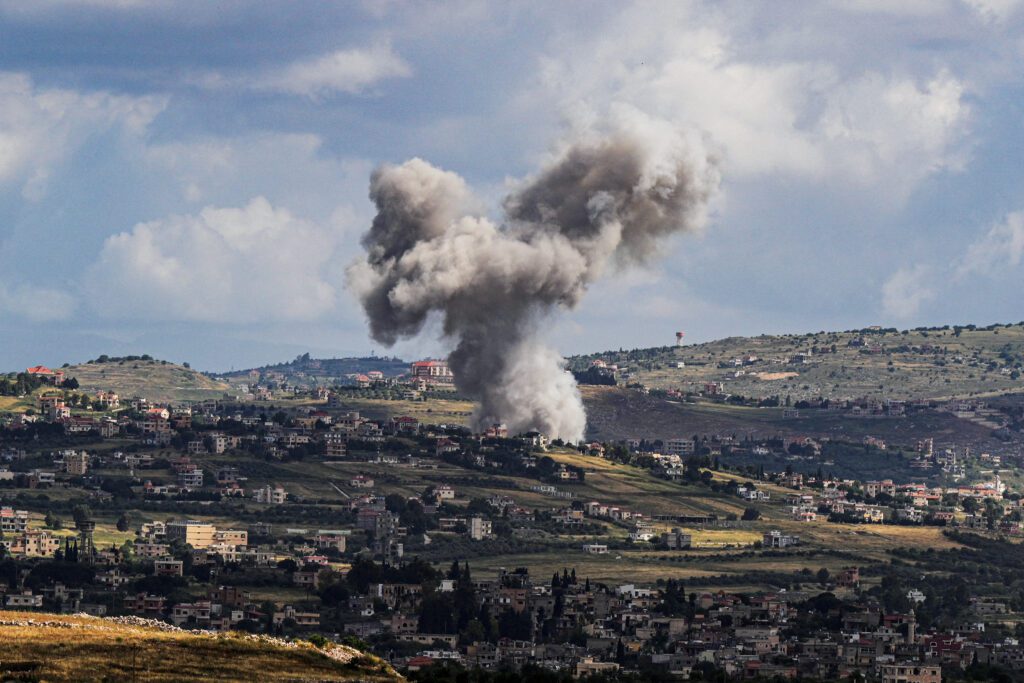On September 23, Israel launched its most extensive wave of air raids against Hezbollah, conducting 300 air strikes that targeted southern Lebanon, the Bekaa Valley, Byblos, and areas near the Syrian border, according to The Times of Israel.
Meanwhile, Lebanese residents are receiving messages and calls from Israel urging them to move away from Hezbollah sites, marking the first such warning to civilians since the Gaza war began nearly a year ago.
The strikes on Lebanon come after Hezbollah fired rockets at Haifa in northern Israel on September 22, marking its deepest incursion since the war began in October.
The group targeted the Ramat David military base and a military tech site near Haifa in retaliation for 400 Israeli strikes on southern Lebanon on September 21, as well as for attacks on Hezbollah’s communication devices on September 17 and 18.
Concerns about a full-scale war between Israel and Hezbollah are rising as Hezbollah declares a “battle of reckoning” with Israel.
Israel’s largest wave of airstrikes on Lebanon
The Israeli army is currently launching attacks on Lebanon on September 23, with military spokesperson Daniel Hagari stating that “preemptive strikes” are targeting Hezbollah sites.
The raids hit towns including al-Tayri, Bint Jbeil, Hanine, Zawtar, and the Nabatieh region in southern Lebanon, as well as areas around Shaara, Harbata, and Hermel, and the towns of Shamstar, Taria, and Bouday in eastern Lebanon, according to Al Jazeera.
In a separate incident, a rocket struck an uninhabited mountainside east of the Lebanese port city of Byblos, marking the first time this area has been targeted in months of fighting between Israel and Hezbollah.
Early in the morning, Israeli jets carried out over 80 air raids in just 30 minutes. Lebanese media reports that one civilian has been killed in the attacks across eastern and southern Lebanon, with 17 others wounded.
A Lebanese shepherd was killed, and six people, including two family members, were injured in an attack in Bodai, according to state media. The Health Ministry also reported 11 additional injuries from a strike in Aitaroun, southern Lebanon.
Urgent messages sent to Lebanese residents
Reuters reports that residents in southern Lebanon are receiving calls from a local number warning them to move away from Hezbollah positions.
Meanwhile, people in Beirut are receiving text messages, reportedly from the Israeli army, urging immediate evacuation, according to Lebanon’s National News Agency (NNA).
This is the first such warning to Lebanese civilians since the Gaza war began nearly a year ago.
Minister of Information Ziad Makary also received a voicemail advising the evacuation of his building. Makary has urged the Lebanese people not to give the warnings “more attention than they deserve,” according to Al Jazeera.
In a televised statement, Israeli military spokesperson Daniel Hagari issued a similar warning, noting that it was being “distributed in Arabic on all networks and platforms in Lebanon” as the Israeli army prepares for more “extensive and precise” strikes against Hezbollah.
Hagari urged Lebanese civilians to move away from Hezbollah sites, warning that “Hezbollah is endangering you and your families.”
When asked about a potential ground incursion into Lebanon, Hagari stated they would “do whatever is needed” to ensure the safe return of northern Israelis, according to Reuters.
Hezbollah’s strike on Haifa
At dawn on Sunday, September 22, Hezbollah fired a barrage of rockets targeting the Haifa region in northern Israel, which marks Hezbollah’s deepest incursion into Israel since the war began in October.
The group claimed responsibility for three attacks: the first two targeted the Ramat David Military base southeast of Haifa. The Ramat David Airbase, located about 50 kilometers from the Lebanon border, serves as the main facility for Israeli aerial operations toward Lebanon and Syria and is the only air force base in northern Israel, according to the Hezbollah-affiliated al-Mayadeen network.
These strikes were in retaliation for intense Israeli bombardments on southern Lebanon, which included 400 strikes the previous day.
The third attack targeted the Rafael Company complex, a military technology site, and was described as a “first” response to assaults on pagers and walkie-talkies in Lebanon, according to L’Orient Today.
The group stated that it launched Fadi 1 and Fadi 2 missiles, along with Katyusha rockets, at the site, as reported by Al Jazeera.
The Israeli military reported that the more than 100 projectiles fired by Hezbollah from Lebanon early Sunday forced hundreds of thousands of Israelis to take cover and led to school closures across northern Israel.
Israel claimed that Hezbollah’s strikes on Haifa, caused significant material damage, alleging that both military and civilian areas were affected. Hezbollah insists it targeted only military sites.
The Israel Defense Forces reported that most rockets were intercepted by air defenses, but some struck Kiryat Bialik, a suburb of Haifa, injuring three people who were taken to Rambam Medical Center for treatment. A teenager died in a car crash as sirens sounded early in the morning, according to The Times of Israel.
The Israeli military also reported that firefighters were battling several blazes near Haifa after some of the 85 rockets fired by Hezbollah hit the area.
The fire along the Lebanon-Israel border is at an all-time high, with the situation continuing to escalate.
